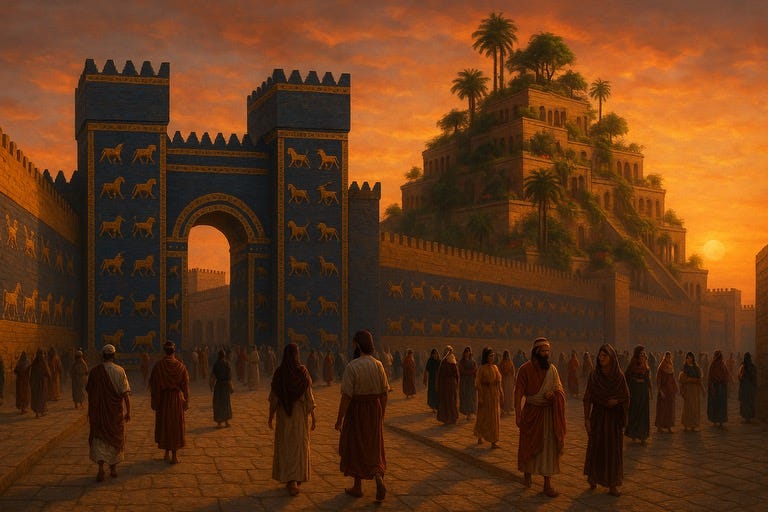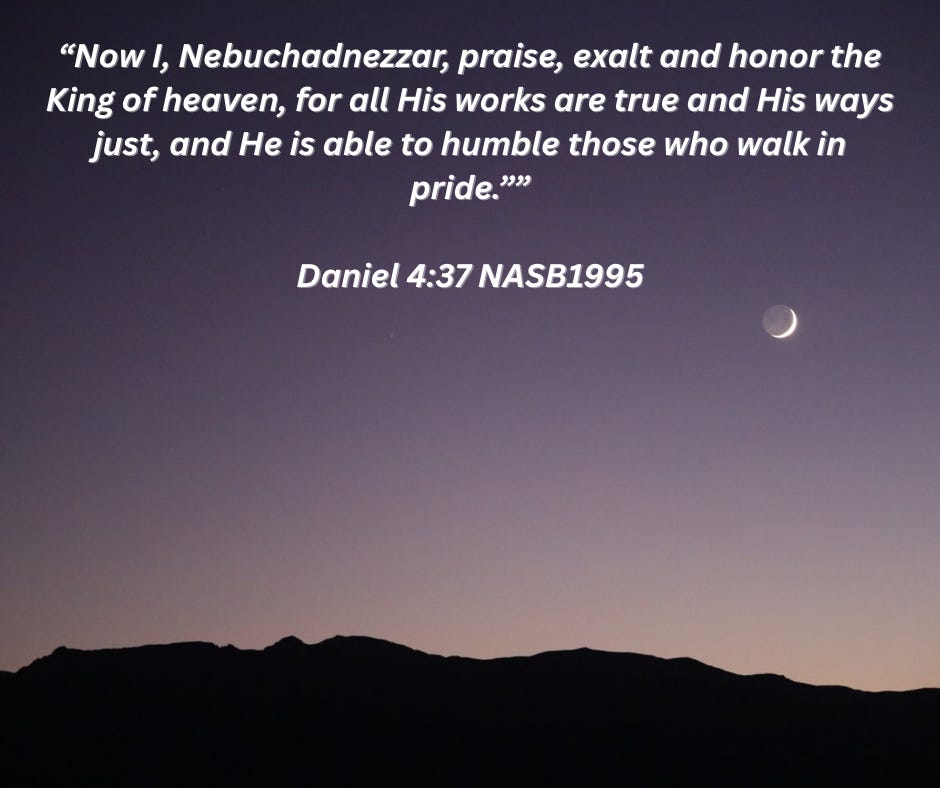Diving into Daniel: The Vision Happens!
Daniel 4:28-37 - Lord, I am nothing and You are sovereign! Let that knowledge form my worship and prayer!
““All this happened to Nebuchadnezzar the king. Twelve months later he was walking on the roof of the royal palace of Babylon. The king reflected and said, ‘Is this not Babylon the great, which I myself have built as a royal residence by the might of my power and for the glory of my majesty?’ While the word was in the king’s mouth, a voice came from heaven, saying, ‘King Nebuchadnezzar, to you it is declared: sovereignty has been removed from you, and you will be driven away from mankind, and your dwelling place will be with the beasts of the field. You will be given grass to eat like cattle, and seven periods of time will pass over you until you recognize that the Most High is ruler over the realm of mankind and bestows it on whomever He wishes.’
Immediately the word concerning Nebuchadnezzar was fulfilled; and he was driven away from mankind and began eating grass like cattle, and his body was drenched with the dew of heaven until his hair had grown like eagles’ feathers and his nails like birds’ claws.
“But at the end of that period, I, Nebuchadnezzar, raised my eyes toward heaven and my reason returned to me, and I blessed the Most High and praised and honored Him who lives forever;
For His dominion is an everlasting dominion,
And His kingdom endures from generation to generation.
All the inhabitants of the earth are accounted as nothing,
But He does according to His will in the host of heaven
And among the inhabitants of earth;
And no one can ward off His hand
Or say to Him, ‘What have You done?’
At that time my reason returned to me. And my majesty and splendor were restored to me for the glory of my kingdom, and my counselors and my nobles began seeking me out; so I was reestablished in my sovereignty, and surpassing greatness was added to me. Now I, Nebuchadnezzar, praise, exalt and honor the King of heaven, for all His works are true and His ways just, and He is able to humble those who walk in pride.””
Daniel 4:28-37 NASB1995
I must say I was pretty impressed with the DALL-E OpenAI image that Steve was able to create for this passage in Daniel. If you look at previous images, Nebuchadnezzar has the same facial features! Although I have many issues with AI, the images that we can create for our devotionals is not one of them. Very stunning!
So twelve months after Daniel interprets the dream for Nebuchadnezzar, the king has obviously forgotten the dream. He is admiring his kingdom and boasting of the might of his power and the glory of his majesty. He probably had good reason to admire his handiwork. This commentary from Renald Showers, quoted in Precept Austin from his book at the link gives some good background on Nebuchadnezzar’s Babylon:
From a purely human viewpoint, Nebuchadnezzar had good reason to boast. He probably was the greatest builder in ancient times. Forty-nine building inscriptions of this king have been uncovered thus far. Most of the bricks recovered from ancient Babylon bear this inscription: “I am Nebuchadnezzar, King of Babylon.” He himself declared that his heart impelled him to build.
Nebuchadnezzar rebuilt the old palace of his father, then built two more palaces. He built seventeen religious temples in Babylon and its suburb, Borsippa. He completed the two great walls that surrounded the city. The outer wall was wide enough for chariots to pass each other on its top. The king installed great fortifications to protect the city and had canals dug from one end of the city to another to facilitate commerce.
One of Nebuchadnezzar’s most splendid projects was the magnificent Ishtar Gate. This was a double gateway through the walls of the city. The walls of this gate were covered with bulls and four-legged dragons in high relief. The approach to the gate was between strong fortress walls on which were rows of lions in relief and covered with brightly colored tiles.
The king’s greatest building feat was the Hanging Gardens. One of Nebuchadnezzar’s wives, the princess of Media, grew homesick for the mountains of her homeland. In order to satisfy her, the king had mountains built on the roof of the royal palace complex. These mountains were planted with trees and other kinds of plants. An ingenious hydraulic machine system was devised to lift water from the Euphrates River to water the elevated gardens. These Hanging Gardens became so famous that the Greeks named them one of the Seven Wonders of the World. (The Most High God- A Commentary on the Book of Daniel).
It would have been interesting to see this place. Just for fun, I had Steve create an AI image of Babylon based on the descriptions in the commentary above:
Well, as they say, pride goes before a fall! Just as Nebuchadnezzar is full of overweening pride for being such an amazing king and builder, a voice comes from Heaven. The voice declares that sovereignty has been removed from the king and he will be driven away from mankind and dwell with the beasts in the field. He will eat grass like cattle and seven periods of time will pass until he recognizes that the Most High is the ruler over mankind.
The writer/owner of Precept Austin (Bruce Hurt) has a handy list of the deadly signs of a proud heart. It would be good for all of us to examine these traits because pride is very difficult to overcome:
Some of the warning signs of a proud heart are:
Usually thinks that he is right.
Easily offended.
Does not like to be corrected.
Often complains about circumstances or people.
Usually ungrateful.
Often impatient with others and sometimes with God.
Not afraid of temptations.
Secretly ashamed of serving Christ.
Likes to talk more than listen; freely offers opinions.
Desires to be first or best.
Needs to be noticed.
Obstinate towards authority.
Quick to find fault with others.
Bold to contradict others.
Demanding and hard to please.
Much more sensitive to personal desires than to the needs of others.
Boasts about achievements.
Lives beyond his means.
Has a hard time forgiving others.
Pride makes people covetous, liars, flatterers, hypocrites, men-pleasers, and contentious.
YIKES! I could easily make a confessional prayer list of just this list of traits and spend a lot of time asking for forgiveness and for help. Humility is oh, so easy to talk about, but so hard to practice!
So Nebuchadnezzar immediately loses his mind and becomes like the man in the image at the top. This exile to the fields of beasts takes place over a period of about seven years (seven periods). Here is what Enduring Word says about this condition and the king’s exile:
c. They shall drive you from men… eat grass like oxen: The announcement came to Nebuchadnezzar in the same words he heard in his dream. This showed him that the dream was about to be fulfilled, and he would be reduced to the existence of an animal – specifically, an ox.
i. The form of insanity in which men think of themselves as animals and imitate the behavior of an animal has been observed. Some call it generally insania zoanthropica and more specifically in Nebuchadnezzar’s case, boanthropy, the delusion that one is an ox.
ii. [John] Walvoord quotes a Dr. Raymond Harrison of Britain, who in 1946 had a patient suffering from boanthropy, just as Nebuchadnezzar suffered.
d. He was driven from men and ate grass like oxen: There is no corresponding record of this seven-year (seven times) period of insanity in the secular historical records of Babylon – exactly as we would expect, considering the customs of that time. Nevertheless, Abydenus, a Greek historian, wrote in 268 B.C. that Nebuchadnezzar was “possessed by some god” and that he had “immediately disappeared.” (Leon Wood)
i. Some dismiss this account of Nebuchadnezzar’s madness as unhistorical, but there is no historical record of his governmental activity between 582 B.C. and 575 B.C. This silence is deafening, especially when we keep in mind how Near Eastern leaders liked to egotistically trumpet their achievements – and hide their embarrassments.
ii. “Although critics have imagined a series of incredible objections to accepting this chapter as authentic and reasonably accurate, the narrative actually reads very sensibly and the objections seem trivial and unsupported.” (John Walvoord)
iii. Nebuchadnezzar was given the opportunity to humble himself, and he did not. Now God humbled him, and the experience was much more severe than it would have been had Nebuchadnezzar humbled himself.
Fascinating! This insanity of thinking you are an animal has precedence in modern clinical psychology. I do find it appalling that there are people in our culture who willingly become something known as “furries”, adopting the characteristics and costumes of animals and then acting accordingly. Often there is no bottom to the dark depths that fallen humanity will explore in their rebellion against God (and aided by the enemy).
Nebuchadnezzar turns his eyes towards Heaven at the end of the seven years, his reason returns to him and he praises God. He prays a second prayer about the sovereignty of God, who has dominion over all and humbles those who have pride. I think this conversion lasted until the end of the king’s life (we hear no more about him after Daniel 4). Enduring Word has great commentary on this passage:
a. At the end of the time: Nebuchadnezzar could not break free from his madness until God appointed the end of the time. Then he had the opportunity to humble himself and lift his eyes to heaven.
i. Nebuchadnezzar knew the principle [Charles] Spurgeon later explained: “The God whom we serve not only exists, but reigns. No other position would become him but that of unlimited sovereignty over all his creatures.”
b. I blessed the Most High and praised and honored Him: Nebuchadnezzar could only see the truth about himself when he first saw the truth about God. The Babylonian King did see who God was, and he eloquently praised His sovereignty. After this his reason returned.
i. This return of reason results in worship. “We do not worship enough, my brethren. Even in our public gatherings we do not have enough worship. O worship the King! Bow your heads now – bow your spirits rather, and adore him that liveth for ever and ever. Your thoughts, your emotions, these are better than bullocks and he-goats to be offered on the altar: God will accept them. Worship him with lowliest reverence, for you are nothing, and he is all in all.” (Charles Spurgeon)
ii. This return of reason results in prayer. If we believe what Nebuchadnezzar believed about God, it will certainly show in our prayer life. We will know that God can change the heart and mind of man, the course of rivers, the flow of the oceans, the distribution of resources, and the assignment of angels.
iii. Spurgeon suggested the proper response of the believer to the greatness and sovereignty of God:
Have a heart of humble adoration.
Show a heart of unquestioning acceptance.
Exercise the spirit of reverent love.
Let your spirit have profound delight.
c. I was restored to my kingdom, and excellent majesty was added to me: God wanted to restore Nebuchadnezzar. The goal wasn’t to bring him low, but to bring him to his proper place before God and among men. Truly, Nebuchadnezzar learned that those who walk in pride He is able to put down.
i. The abiding lesson is plain: God resists the proud but gives grace to the humble (James 4:6). There have been many who rise from humble origins to great glory, and then fall. Perhaps it is better to have never been raised up than to rise and then fall. Most, if not all, fall through pride; and a proud look is number one on the list of God’s most hated sins (Proverbs 6:16-19).
ii. We also see that God will glorify himself among the nations. When Nebuchadnezzar took some of the treasures of the Jerusalem temple and put them in the temples of his gods, he had reason to believe that his gods were stronger than the God of Abraham, Isaac and Jacob. By the end of Daniel 4, Nebuchadnezzar knew which God was the true God. And when Nebuchadnezzar knew it, he wasn’t shy about telling people what he had learned – he was a true witness, giving testimony to God’s great works.
iii. Some find prophetic significance in this account. Since Babylon is used in the Scriptures as a figure of the world system in general, we can say:
Nebuchadnezzar’s madness foreshadows the madness of Gentile nations in their rejection of God.
Nebuchadnezzar’s fall typifies Jesus’ judgment of the nations.
Nebuchadnezzar’s restoration foreshadows the restoring of some of these nations in the millennial kingdom.
Excellent commentary, especially the quotes from the inestimable Charles Spurgeon! You will note that Nebuchadnezzar was not restored to some anonymous peasant life, but was returned to his role as king, now that he was properly humbled and enlightened.
My next devotional examines Daniel 5:1-12 - Belshazzar’s feast and a mysterious hand writing on the wall. A queen remembers Daniel.
Heaven on Wheels Daily Prayer:
Dear Lord - I pray that I have the proper response to Your Sovereignty by:
Having a heart full of humble adoration.
Showing a heart of unquestioning acceptance.
Exercising the spirit of reverent love.
Letting my spirit have profound delight.
Amen!
Scripture quotations taken from the (NASB®) New American Standard Bible®, Copyright © 1960, 1971, 1977, 1995 by The Lockman Foundation. Used by permission. All rights reserved. lockman.org
Precept Austin was accessed on 04/09/2025 to review commentary for Daniel 4:28-37.
Commentary from Enduring Word by David Guzik is used with written permission.





